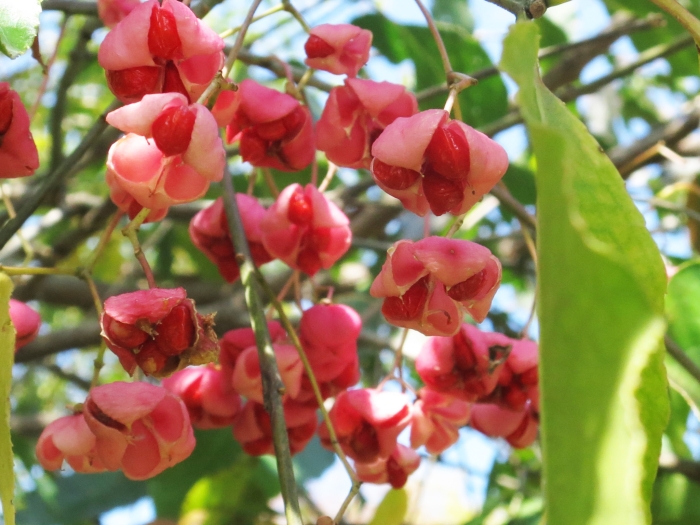Himalayan Spindle
(Euonymus maackii)
Himalayan Spindle (Euonymus maackii)
/
/

Repina Tatyana
CC BY 4.0
Image By:
Repina Tatyana
Recorded By:
Copyright:
CC BY 4.0
Copyright Notice:
Photo by: Repina Tatyana | License Type: CC BY 4.0 | License URL: http://creativecommons.org/licenses/by/4.0/ | Rights Holder: Repina Tatyana | Publisher: iNaturalist | Date Created: 2019-09-27T13:44:29-07:00 |
























Estimated Native Range
Summary
Euonymus maackii, commonly known as Winterberry Euonymus and Himalayan Spindle, is a deciduous shrub or small tree native to mixed forests, forest edges, and riverbanks in Northeast Asia, including regions of China, Korea, and Russia. It can grow as a shrub reaching around 3 meters or as a tree up to 20 meters tall, with a typical width of 2-4 meters. The leaves are oval to elliptical with pointed tips, up to 15 centimeters long, and have a leathery to papery texture with rough surfaces and slightly wavy edges. The inflorescence consists of cymose clusters of several small, white flowers that bloom in late spring to early summer. The flowers are not particularly showy, but the plant is valued for its bright fall foliage, which turns various shades of red, pink, and yellow, and for its fruits and large seeds, which are considered ornamental.
Winterberry Euonymus is appreciated for its vibrant autumn colors and is often used in urban plantings, borders, and as a specimen plant. It is also suitable for creating natural hedges or screens. This species prefers full sun to part shade and requires medium water, thriving in well-drained soils. While it is generally easy to maintain, it can be susceptible to scale insects and anthracnose. Cultivars such as ’Coral Charm’ and ’Red Elf’ offer variations in fruit and seed colors, adding to the plant’s decorative appeal. Gardeners should be cautious as all parts of the plant are toxic if ingested, and it can become invasive when grown outside its native range.CC BY-SA 4.0
Winterberry Euonymus is appreciated for its vibrant autumn colors and is often used in urban plantings, borders, and as a specimen plant. It is also suitable for creating natural hedges or screens. This species prefers full sun to part shade and requires medium water, thriving in well-drained soils. While it is generally easy to maintain, it can be susceptible to scale insects and anthracnose. Cultivars such as ’Coral Charm’ and ’Red Elf’ offer variations in fruit and seed colors, adding to the plant’s decorative appeal. Gardeners should be cautious as all parts of the plant are toxic if ingested, and it can become invasive when grown outside its native range.CC BY-SA 4.0
Plant Description
- Plant Type: Shrub, Tree
- Height: 15-20 feet
- Width: 10-15 feet
- Growth Rate: Moderate
- Flower Color: Cream, Green
- Flowering Season: Spring
- Leaf Retention: Deciduous
Growth Requirements
- Sun: Full Sun, Part Shade
- Water: Medium
- Drainage: Medium
Common Uses
Bank Stabilization, Bee Garden, Bird Garden, Border Plant, Drought Tolerant, Low Maintenance, Rabbit Resistant
Natural Habitat
Mixed forests, forest edges, and riverbanks in Northeast Asia
Other Names
Common Names:
Scientific Names: , Euonymus bungeanus, Euonymus maackii, Euonymus hamiltonianus var. maackii, Euonymus trapococcus, Euonymus quelpaertensis, Euonymus bungeanus var. semipersistens, Euonymus bungeanus f. pendulus, Euonymus coreanus, Euonymus hamiltonianus var. semipersistens
GBIF Accepted Name: Euonymus maackii Rupr.